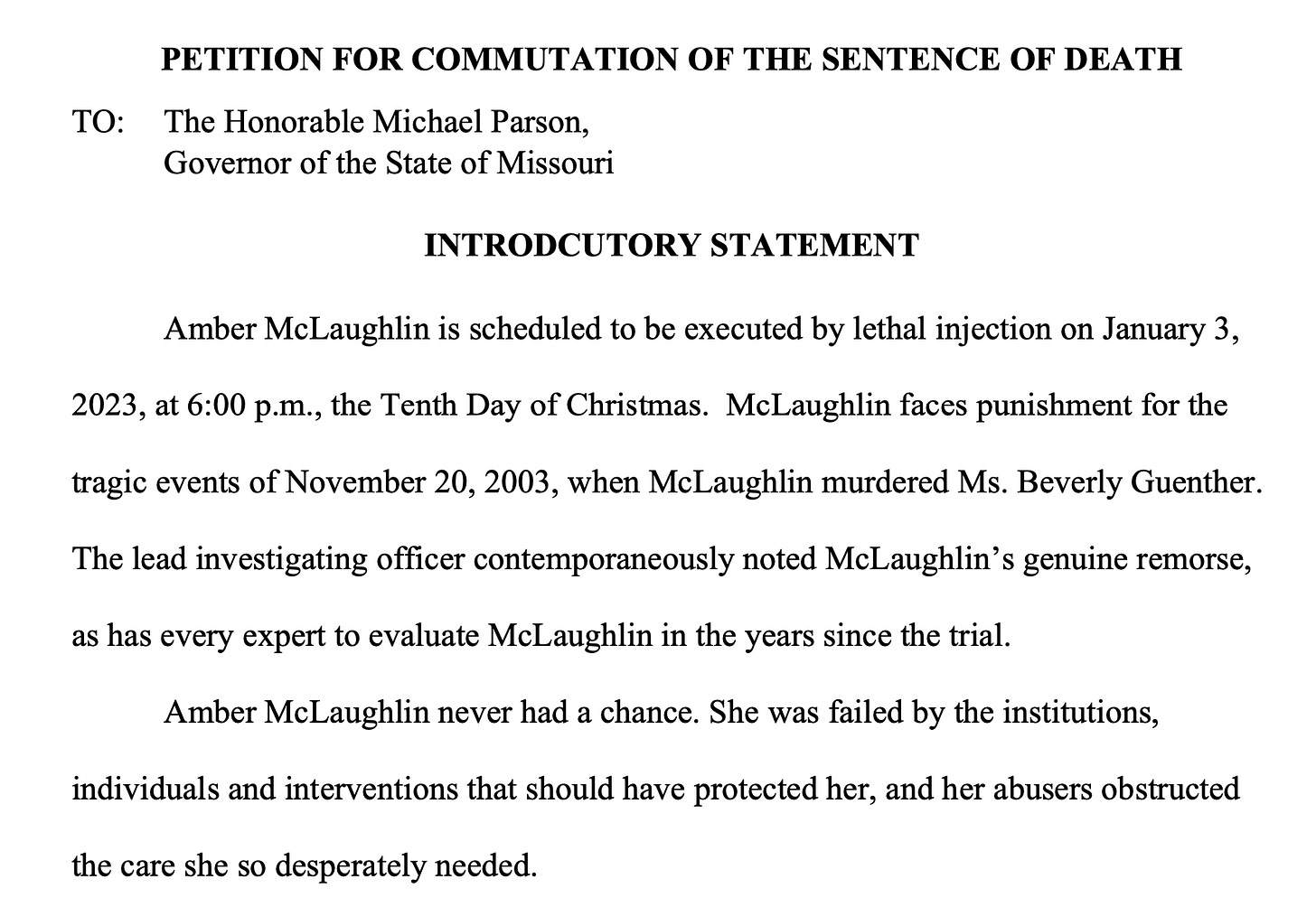Missouri executed a transgender woman whose jury did not recommend death
Missouri is one of two states that allows a judge to impose a death sentence under certain circumstances if the jury can't decide on a sentence.
It already feels like there’s a lot going on in 2023 — with questions remaining about whether Kevin McCarthy is actually going to become the Speaker of the House of Representatives and Damar Hamlin collapsing at the Monday Night Football game, sending him to the hospital reportedly in critical condition and ending the game for the night.
There will be much more reporting on both of those important stories throughout the day today.
I’d like to focus attention for a moment this morning on a different story.
This evening, Missouri is scheduled to carry out the first execution of the year just three days into the year.
Amber McLaughlin is scheduled to be executed for the 2003 murder of her ex-girlfriend.
There is no litigation pending; the only outstanding question is whether Missouri Gov. Mike Parson, a Republican who has overseen four executions as governor, will grant McLaughlin clemency.
[Update at 4 p.m. ET: Parson announced that the execution will be proceeding today, which was reported as a denial of McLaughlin’s clemency request.
Update at 8:30 p.m. ET: Missouri executed Amber McLaughlin. The reported time of death was 6:51 p.m. CT.]
McLaughlin is transgender, and much of the media coverage has focused on the fact that she would be the first openly transgender woman executed in the United States. A CBS/AP story detailed that “McLaughlin began transitioning about three years ago” and received help from another trans person who was in prison at the time in dealing with the “paperwork and bureaucracy,” but also in addressing her fears for her safety in prison.
In addition to that aspect of McLaughlin’s story, there is a legal issue that should be getting more attention than it has: McLaughlin is one of the few people in the nation facing execution despite no jury having voted to sentence them to death.
There are, to be clear, other issues, too. McLaughlin’s story — as with so many people on death row — also includes questions about intellectual capacity and features a childhood that included severe abuse, factors mentioned in some of the other reporting. She also would be the first woman to be executed in Missouri in the modern era of the death penalty.
Although a federal district court had actually ordered a new sentencing phase for McLaughlin, the US Court of Appeals for the Eighth Circuit reversed the district court’s decision in 2021.
Part of the district court’s decision was based on Missouri’s outlier death penalty law, which allows a judge to choose whether to impose death at the final step of the sentencing phase if the jury can’t reach a decision. (Only Indiana today has a similar law. Indiana last carried out an execution in 2009, however, and only eight people were on the state’s death row as of last April. Missouri has carried out 26 executions since Indiana’s most recent execution, and has more than twice as many people on death row.)
Here was how the Eighth Circuit described how the Missouri law was carried out in McLaughlin’s case:
The Eighth Circuit decided that, under current US Supreme Court law and under the Missouri Supreme Court’s interpretation of its law, Missouri’s outlier death penalty law is constitutional. That was one of several rulings made by the Eighth Circuit that ultimately kept McLaughlin’s original death sentence in place, leading to today’s scheduled execution.
McLaughlin’s lawyers address the outlier state law as the first of three reasons for Parson to grant her clemency.
As put in McLaughlin’s clemency petition:
The lawyers are not alone.
Reps. Cori Bush and Emanuel Cleaver also have asked Parson to grant the clemency request, in part based on the Missouri law.
Noting the above passage of the petition, the pair wrote that “the jury deadlocked on whether to impose capital punishment; at that point, a single person – the presiding judge – stepped in and unilaterally condemned Ms. McLaughlin to death.”
Now, the decision on Amber McLaughlin’s life will apparently come down to Parson.
MORE ON THE CASE: Ryan Krull, “Amber McLaughlin transitioned on death row. Now she faces execution,” St. Louis Public Radio, Dec. 15, 2022
MORE ON THE LAW: Michael Essma, “DEAD-Locked: Evaluating Judge-Imposed Death Sentences Under Missouri’s Death Penalty Statute,” Missouri Law Review, Winter 2020






I am always struck by the irony that these so-called "pro life" states just fall all over themselves to execute people whenever/wherever possible.
So sad. What has this country become so hateful.